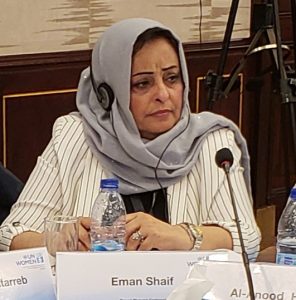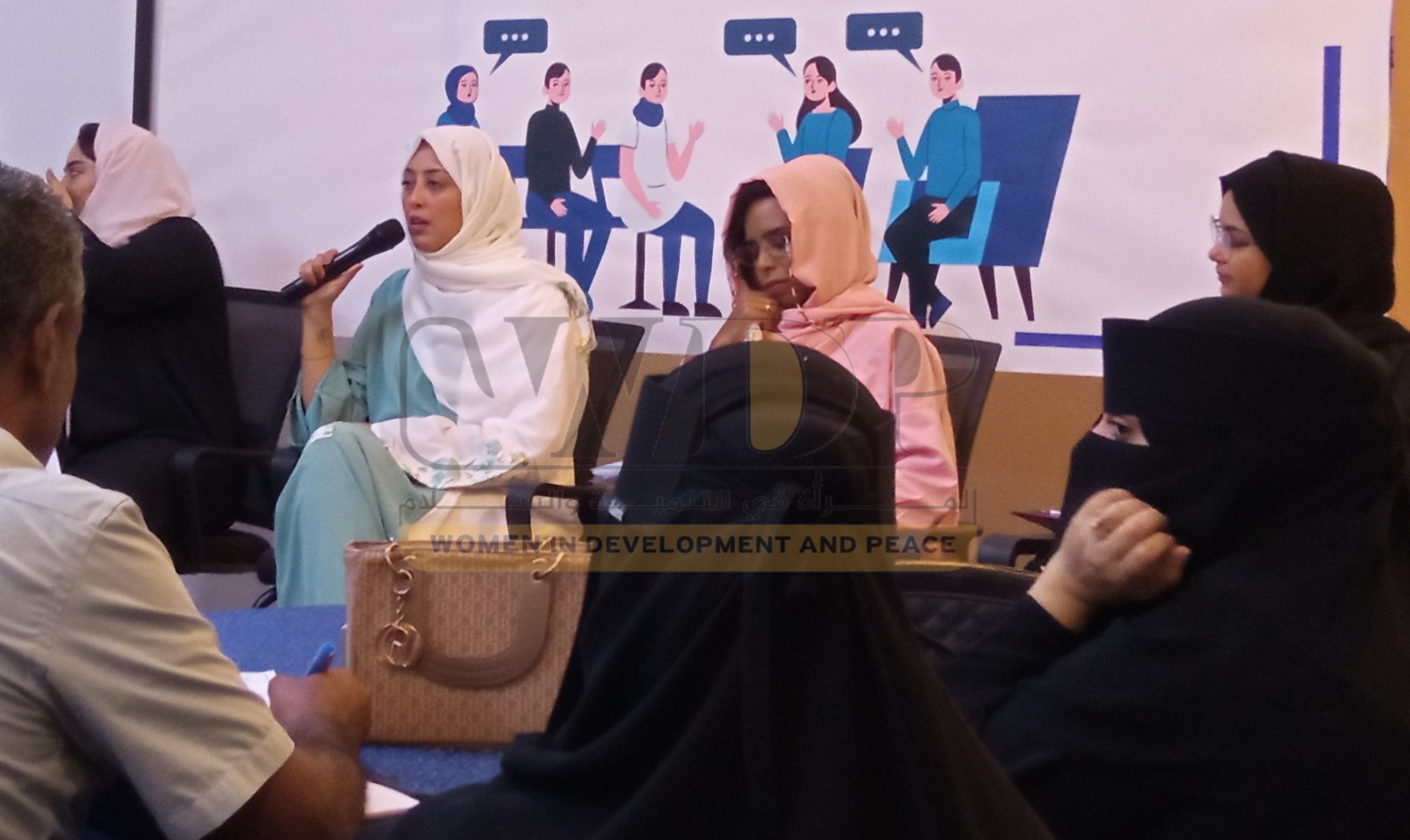Women in Development and Peace – Hebah Mohammed
In light of the difficult circumstances that Yemen has witnessed for years, and which have left serious humanitarian repercussions and challenges on all segments of society, the will of Yemeni diplomatic women emerges as an important factor in resolving the conflict, achieving peace, and rebuilding the nation. They possess an undeniable amount of inspiration and effective influence in various fields related to political work and are a unique voice in the international arena. Additionally, they work as a bridge for dialogue and understanding between conflicting parties, striving to achieve national reconciliation.
Yemeni women have made many achievements in diplomatic work over the past years, as they have effectively contributed to many negotiations and agreements aimed at achieving peace in Yemen and have also provided real assistance in providing humanitarian aid to those affected in various Yemeni governorates.
Women Diplomats and Peacebuilding
Press reports confirm that Yemeni women diplomats are an influential value in the process of achieving peace in Yemen, thanks to their unique capabilities and broad vision in various life fields that are of primary concern to society, and they also have the ability to enhance dialogue and understanding between the conflicting parties and seek to reach permanent and sustainable settlements. Yemeni women diplomats are pioneers in involving local communities and women in the peacebuilding process, and in promoting social justice and human rights.
 Iman Shaif, a member of the National Dialogue Conference and a member of the Yemeni Women Pact for Security and Peace, says: “Yemeni women are far from real diplomatic work, especially at this stage; we must know the general concept of diplomatic work, which is usually the assignment of a person from a country to negotiate with representatives of other countries on various issues, and to carry out some tasks on behalf of the authorized person, as diplomacy is directly related to the negotiation process. Currently, the situation in the country is very difficult and needs to achieve comprehensive peace, and the process of strengthening the negotiation process in Yemen lacks the official presence of women.”
Iman Shaif, a member of the National Dialogue Conference and a member of the Yemeni Women Pact for Security and Peace, says: “Yemeni women are far from real diplomatic work, especially at this stage; we must know the general concept of diplomatic work, which is usually the assignment of a person from a country to negotiate with representatives of other countries on various issues, and to carry out some tasks on behalf of the authorized person, as diplomacy is directly related to the negotiation process. Currently, the situation in the country is very difficult and needs to achieve comprehensive peace, and the process of strengthening the negotiation process in Yemen lacks the official presence of women.”
She continues: “In fact, we notice that women play a major role in this aspect, although it is unofficial; for example, the voices of many women’s civil society organizations reach international diplomacy; they are called upon to participate in the peace process and to present proposals to achieve it and use its tools.”
She pointed out that when Yemeni women engage in diplomatic work, they always advocate for peace. The inherent nature of women makes them less involved in conflicts and not the decision-makers in creating conflicts. Conflict usually arises from decisions made by one party, whereas the peace process requires the participation of all parties. It is through this inclusive participation that the sounds of gunfire are silenced, and diplomatic negotiations involving of all parties, including women, begin.
She stresses that many of the official negotiating committees in Yemen did not include more than one female member, and her participation was weak despite the importance of her role, especially at this stage, and in the process of resolving conflicts in particular, as women are realistic and affected by the continuation of the conflict.
The Role of Women in the Peace Process
“The role of women in the peace process is crucial and important; as they care about issues that concern all segments of society, and they can ably bring the women’s agenda to the negotiating table. Men often overlook many issues that concern women and vulnerable groups in society, and the dominant male authority in the negotiation process may ignore them. We also know that men are mostly concerned with the political aspect and the sharing of power and positions, but the presence of women highlights the issues of society in general, and the issues of women in particular, as the most important issues that must be on the negotiating table,” said Iman Shaif.
Regarding the activities and programs carried out by Yemeni women to promote the peace movement, Shaif says: “Many activities of diplomatic women have emerged, calling for peace since the beginning of the conflict in Yemen; Yemeni women have always been the first to promote peace activities, and men have never preceded them. Women established women’s organizations and blocs in Yemen after the conflict, and these women’s blocs call for national reconciliation among their goals.”
Shaif explains that one of the most important goals of women is to stop conflicts, call for peace, and create peaceful solutions. She has presented many proposals, and there are two components of Women’s Solidarity and Yemeni Women Pact that have presented a roadmap with a purely feminist vision to achieve lasting peace in Yemen.
For her part, the human rights activist Widad Al-Badawi participates, and points out that there is unofficial diplomacy that women have worked on during the past years regarding the peace process, including feminist diplomacy, which has been adopted by a number of women working abroad to convey the voices of peace during the years of conflict to decision-makers and the corridors of the United Nations and various organizations.
She explained that Yemeni women, who are refugees in different countries, have created a special feminist diplomacy that carries the concerns of Yemeni society, especially the concerns and issues of women away from the state, and have greatly affected the Yemeni peace file, and have brought the voices of society to international actors, and made Yemeni women an incubator for peace on various international platforms.
Al-Badawi believes that unofficial feminist diplomacy is present and influential without the support or interest of the official authorities.
She stressed that despite the decision-makers’ disregard for the role of Yemeni women, women have fulfilled their humanitarian duty for the sake of peace and have built a bridge of communication between women inside and outside the country and have proven their presence far from official diplomacy. They have also helped to bring the issues of Yemeni women to the international community at a time when the Yemeni decision-maker did not hear them.
Effective Efforts in the Diplomatic Peace Process
Regarding prominent examples of impactful diplomatic peace efforts by Yemeni women, do you think that Yemeni women’s diplomatic activity is very weak but still present? Notably, Faiqa Al-Sayyid and Rana Ghanem participated in the first negotiation process in Kuwait, representing conflicting parties in Yemen. However, these models did not lead to a genuine agreement, and due to the failure of these negotiations, the role of women did not significantly emerge.
Continuing, I believe that one remarkable female model in the journey of diplomacy and peace is Amina Mohsen, the ambassador of good intentions and the president of the Yemeni Women’s Union in Abyan branch. Such appointments are honorary rather than official, where Yemeni women strive to highlight a culture of peace and advocate for ending conflicts and their risks on people, women, and children.”
Al-Badawi pointed out Yemeni women worked independently, with an active female presence in the peace process; as women were the first to call for peace in Yemen, in the first month of the outbreak of the conflict. Officially, women’s components were formed in October 2015 calling for the achievement of peace.
Al-Badawi added that all those participations, works, conferences, meetings and forums in which Yemeni women participated and called for the achievement of peace were rejected by the Yemeni parties to the conflict. In Fact, their advocacy for peace was met with opposition to the extent that they were actively fought against and even considered a party to the conflict themselves. Despite this challenge, women continue to call for peace, through the dialogue table and peaceful negotiations, as they were the first to maintain community peace with their vulnerable groups of women and children.
Maha Awad, President and Founder of the Women’s Summit in Aden, explained that women and women’s organizations played a major role in promoting local peace, and the Association of Mothers of Abductees helped release 566 abductees, detainees and forcibly disappeared. Women also participated in humanitarian relief efforts for internally displaced persons and affected families, providing first aid and psychosocial support.
Difficulties Faced by Yemeni Women
Regarding the difficulties Yemeni women in bringing about peace, Shaif confirms that men monopolize diplomatic work; Because of their belief and their declared statement that women have no role to play in this difficult stage, and that those who have the right to negotiate are those who carry weapons, while women’s role comes after reaching a peace agreement, through the process of development and reconstruction.
She also believes that this negative view among male leaders and decision-makers has reached a full conviction that diplomatic work to negotiate peace is the prerogative of the parties to the conflict and those who bear arms only. This mindset has posed a major obstacle to the participation of Yemeni women in the negotiation process. Moreover, societal restrictions further hinder them from participating in achieving peace, in addition to the security aspects and the prevailing male domination in Yemeni society.
Proposed Solutions
Regarding the appropriate solutions that may encourage the competent authorities to focus on women’s participation in international partnerships and agreements calling for peace, Shaif says: “Women should intensify their community activities in the field of community peace and mediation, and convince society that women are capable of achieving peace, and the importance of involving them in the networking and advocacy process with decision-makers, especially in the diplomatic process. There must be bridges extended between women and decision-makers and others, in addition to exploiting real female models in society, who are able to convey the voices of women to the international community.”

